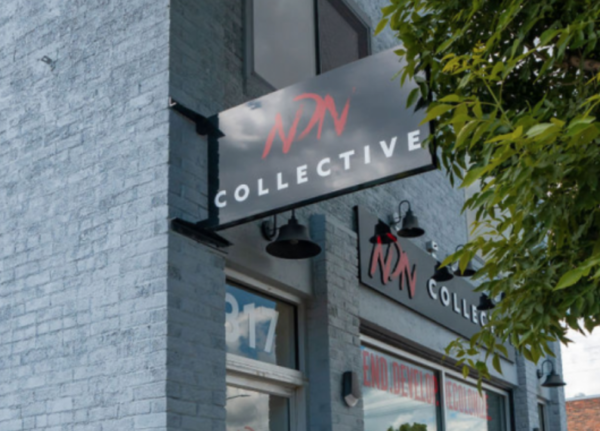
- Details
- By Native News Online Staff
RAPID CITY, S.D. — NDN Collective, Inc. announced a new project Thursday that will provide grants, communication and strategic support to tribal nations, Indigenous-led organizations and individuals providing essential services to Indian Country.
The Rapid City, S.D.-based nonprofit organization said the $10 million, multi-phased project has been launched with an initial investment of $3.5 million from NDN’s partners. NDN Collective is actively seeking additional resources to bolster immediate on-the-ground responses and long-term emergency, transition and recovery planning.
The response project is designed to provide quick-response resources to Indigenous communities bracing from economic impacts, stresses to public services and combating the spread of misinformation due to COVID-19. Funding will be made for those in Indian Country for:
- Medical supplies
- Food delivery
- Youth and / or Elder care
- Educational Access
- Shelter and Housing
- Economic Relief
- Social - Emotional Support
- Cultural, Ceremonial, Spirit-Aligned Support
- Information and Communications — Access to accurate information; Radio/T.V., Internet
“NDN realizes that Native Nations will experience unique impacts and challenges with the COVID19 crisis, in no small part due to the current reality and history of social, economic and political disenfranchisement of our people,” NDN President and CEO Nick Tilsen said in a statement. “While our elected Tribal officials navigate the crisis and lead their respective communities, NDN is doing our part to coordinate resources and offer our assistance during these unprecedented times.”
Initially, the Response Project will concentrate on supporting tribal essential services to mitigate the impact of COVID-19 in tribal communities while awaiting resources from the federal stimulus package to reach tribes and Indigenous urban communities.
“While the federal stimulus package has some great resources that will soon be available for tribes and tribal serving organizations, many frontline groups, rural and understaffed Tribes will be at a disadvantage to gain access to those resources,” said Michael Johnson, collective director of advancement for NDN. “NDN’s Project is meant to bolster and support existing services and make sure that our people have access to essential services during this time.”
Through this project, NDN is prioritizing requests that demonstrate experience and capability and can detail the effect of immediate response planning, access to expanded health care services, adequate housing, and additional food and supplies that will benefit their communities.
To learn more about the NDN Covid-19 Response Project grants, announcements and resources can be found on the NDN Collective CLICK HERE.
More Stories Like This
Native News Weekly (August 25, 2024): D.C. BriefsUS Presidents in Their Own Words Concerning American Indians
Oral History Project Announces 14th Stop in Portland, Oregon: NABS Continues to Gather Crucial Stories Across Indian Country
Deb Haaland Tours Center for Veterans Struggling with Homelessness
WWII Monument Honors First Americans Who Helped Liberate Italy
Help us tell the stories that could save Native languages and food traditions
At a critical moment for Indian Country, Native News Online is embarking on our most ambitious reporting project yet: "Cultivating Culture," a three-year investigation into two forces shaping Native community survival—food sovereignty and language revitalization.
The devastating impact of COVID-19 accelerated the loss of Native elders and with them, irreplaceable cultural knowledge. Yet across tribal communities, innovative leaders are fighting back, reclaiming traditional food systems and breathing new life into Native languages. These aren't just cultural preservation efforts—they're powerful pathways to community health, healing, and resilience.
Our dedicated reporting team will spend three years documenting these stories through on-the-ground reporting in 18 tribal communities, producing over 200 in-depth stories, 18 podcast episodes, and multimedia content that amplifies Indigenous voices. We'll show policymakers, funders, and allies how cultural restoration directly impacts physical and mental wellness while celebrating successful models of sovereignty and self-determination.
This isn't corporate media parachuting into Indian Country for a quick story. This is sustained, relationship-based journalism by Native reporters who understand these communities. It's "Warrior Journalism"—fearless reporting that serves the 5.5 million readers who depend on us for news that mainstream media often ignores.
We need your help right now. While we've secured partial funding, we're still $450,000 short of our three-year budget. Our immediate goal is $25,000 this month to keep this critical work moving forward—funding reporter salaries, travel to remote communities, photography, and the deep reporting these stories deserve.
Every dollar directly supports Indigenous journalists telling Indigenous stories. Whether it's $5 or $50, your contribution ensures these vital narratives of resilience, innovation, and hope don't disappear into silence.
 The stakes couldn't be higher. Native languages are being lost at an alarming rate. Food insecurity plagues many tribal communities. But solutions are emerging, and these stories need to be told.
The stakes couldn't be higher. Native languages are being lost at an alarming rate. Food insecurity plagues many tribal communities. But solutions are emerging, and these stories need to be told.
Support independent Native journalism. Fund the stories that matter.
Levi Rickert (Potawatomi), Editor & Publisher

